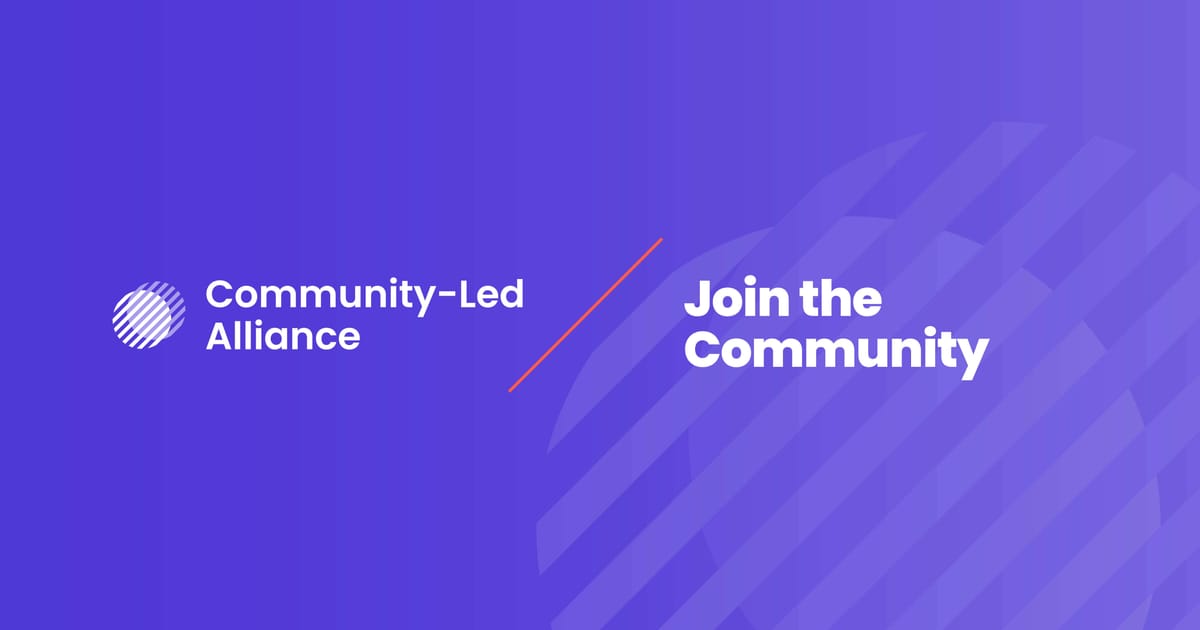When it comes to building and engaging a community, events are a powerful tool that can strengthen bonds, foster networking, and enhance the overall community dynamics. Whether in-person or online, these gatherings are a crucial platform for sharing ideas, celebrating achievements, or creating a shared sense of identity among members.
But behind the success of an event lies a range of complex challenges that community managers navigate daily. From the initial conceptualization stage to the logistics of venue selection and marketing, it’s a long and exhausting task list. Fortunately, there are a range of tools designed to streamline the process, enhance engagement, and help in the seamless execution of events.
From planning and management platforms to engagement enhancers and analytical tools, there’s a diverse range of tools designed to tackle the challenges of event organization. With these tools, community managers can not only alleviate the stress associated with event planning but also significantly increase the chances of hosting successful and memorable events.
In this article, we’ll take you through some examples of the types of tools available and how you can harness them as a community manager.
Event planning and management tools
The cornerstone of any successful event lies in the planning and management. With the right tools, community managers can transform event organization into a streamlined and efficient process.
Here’s a look at the essential tools designed to facilitate every phase of event management, from inception to execution.
Event management platforms
Event management platforms are a useful tool for their ability to offer an all-in-one solution. These platforms are designed to simplify event planning, providing tools for event creation, promotion, registration, and post-event analytics.
Eventbrite
Eventbrite is one example of an event management platform, offering a suite of features that allow community managers to:
- Create and customize event pages: Users can design event pages that reflect the theme and branding of their event, making it appealing and informative for potential attendees.
- Promote events: Eventbrite integrates promotional tools and social media integration, enabling organizers to reach a wider audience and boost event visibility.
- Manage registrations and ticketing: With its streamlined registration and ticketing system, Eventbrite makes it easy for attendees to sign up for events while providing organizers with real-time data on registrations and attendance trends.
- Analyze event success: Post-event analytics are crucial for measuring success and identifying areas for improvement. Eventbrite offers detailed reports on attendee engagement, ticket sales, and more, helping organizers to refine their strategies for future events.

Project management tools
While comprehensive event management platforms offer specialized functionalities for event organization, general project management tools can also be incredibly effective in planning and coordinating events.
These tools are useful for task assignments, managing deadlines, and fostering collaboration among team members, making them invaluable for the event planning processes.
Asana
While not specifically designed for event management, Asana has a range of highly beneficial features for organizing a range of tasks involved in event planning.
Asana allows for detailed task management, enabling community managers to create tasks, assign them to team members, set deadlines, and track progress. Its visual project timelines and calendar views help in ensuring that all aspects of the event planning process are on track and visible to the entire team.
Trello
Similar to Asana, Trello also functions as an incredibly useful tool for planning projects thanks to its adaptability and user-friendly interface.
Trello uses a card-based system where each task or element of the event can be represented as a card within a board. These cards can be categorized, assigned to team members, and moved across different stages of completion, offering a highly visual and interactive way to manage the planning process.
Both Asana and Trello foster effective communication and collaboration, ensuring that all team members are aligned. Their flexibility and ease of use make them an excellent choice for community managers looking to keep their event planning organized and efficient.
Audience engagement and interaction tools
Engaging the audience is a crucial element of any successful event. It transforms passive attendees into active participants, creating a more memorable experience.
This section explores tools specifically designed to enhance audience interaction and engagement through innovative features like live polling, Q&A sessions, and effective social media management.
Live polling and Q&A platforms
Interactive sessions such as live polls and Q&A segments are invaluable for increasing audience participation and gathering instant feedback. These tools allow community managers to gauge attendee opinions, tailor content in real-time, and foster a sense of community.
Slido
Slido is a platform for live audience engagement, offering integrations with presentations and video conferencing tools. Key features include:
- Live polling: Enables organizers to create polls before or during the event, encouraging attendees to vote on questions or topics in real-time. This not only engages the audience but also provides valuable insights into their preferences and opinions.
- Q&A sessions: Slido simplifies the process of conducting Q&A sessions, allowing attendees to submit questions digitally and vote on those they find most interesting. This democratic approach ensures that the most relevant and popular questions are addressed.
- Feedback collection: Post-event feedback is crucial for improvement. Slido offers features to collect feedback efficiently, helping organizers understand what worked well and what could be enhanced for future events.

Social media management tools
Social media plays a crucial role in event promotion and engagement, offering a platform for reaching out to potential attendees, creating event awareness, and fostering community discussions.
Effective social media management tools are essential for scheduling posts, analyzing engagement, and tracking the success of social media campaigns.
Hootsuite
Hootsuite is a widely used social media management tool designed to streamline social media activities.
Hootsuite allows community managers to manage multiple social media accounts from a single dashboard, schedule posts in advance, monitor mentions and keywords, and analyze social media traffic.
Its ability to track conversations and engagement metrics in real-time makes it invaluable for adjusting strategies on the fly during events.
Buffer
Buffer is similar to Hootsuite, offering a simpler user-friendly interface for scheduling posts, analyzing performance, and managing interactions across different social media platforms.
Its analytics capabilities help organizers understand the reach and impact of their promotional efforts, ensuring they can optimize their strategies for maximum engagement.
By integrating live polling and Q&A platforms along with sophisticated social media management tools, community managers can significantly enhance audience engagement before, during, and after events.
Virtual event platforms
In the wake of the COVID-19 pandemic, virtual events have remained a key staple for many organizations as a way to engage their customers around the globe. They’ve revolutionized the way we think about gatherings, opening up new possibilities for interaction and engagement.
Here are some of the tools that can make virtual events not just possible, but engaging, ensuring participants have a fun, interactive experience.
Webinar and virtual conference platforms
Webinar and virtual conference platforms are specialized tools designed to facilitate online events, from small workshops to large-scale conferences.
These platforms offer a variety of features, such as virtual rooms, networking opportunities, and seamless integration with other event management tools, making them essential for today's virtual event organizers.
Zoom
Zoom has become synonymous with virtual meetings and webinars, offering a reliable and user-friendly platform for live video communications.
Beyond its video conferencing features, Zoom supports breakout rooms for smaller group discussions, webinar hosting with hundreds to thousands of participants, and integration with event management and ticketing platforms.
It also provides tools for live polling and Q&A sessions, making it a versatile choice for various virtual event formats.
Hopin
Hopin is designed specifically for virtual conferences, offering a comprehensive suite of features that mimic the experience of in-person events. It provides virtual stages for keynotes, breakout sessions for workshops, networking areas for one-on-one video interactions, and expo areas for sponsors and exhibitors.
Hopin's strength lies in its ability to create an immersive and interactive event environment, encouraging participation and networking among attendees.

Virtual event engagement tools
While virtual platforms provide the infrastructure for online events, engagement tools are crucial for making these events interactive and enjoyable. These tools are designed to enhance participant engagement through innovative features like virtual networking spaces, gamification, and interactive sessions.
Gather.town
Gather.town offers a unique approach to virtual events by combining video-calling with a 2D map, allowing participants to move around virtual spaces and interact with others as if they were in a physical location.
This platform stands out for its gamification elements and customizable spaces, which can be designed to replicate conference halls, networking lounges, or even casual meetup spots. Participants can engage in one-on-one conversations, group discussions, or interactive workshops, providing a more natural and engaging virtual event experience.
By leveraging these webinar and virtual conference platforms along with dedicated engagement tools, organizers can host virtual events that are not only informative but also interactive and engaging.
Financial and sponsorship management tools
Managing the financial and sponsorship aspects of an event is critical for its success. These elements not only ensure the event’s financial success, but also foster healthy relationships with sponsors, which contributes to the overall sustainability of the event.
Here are some tools designed to streamline the financial management of event planning.
Budgeting and financial tracking tools
Managing the budget for an event requires meticulous planning and attention to detail. The right budgeting and financial tracking tools can simplify the process, enabling community managers and event organizers to keep a close eye on expenses, manage cash flow, and generate financial reports.
QuickBooks
QuickBooks is known for its robust accounting features, making it an ideal choice for event organizers looking to manage their finances effectively. With QuickBooks, users can track event expenses, categorize them into different budgets, and monitor overall financial health.
The platform also offers invoicing capabilities, making it easier to manage payments to vendors and partners. Additionally, its detailed financial reporting tools help organizers analyze spending patterns and make informed decisions for future events.
FreshBooks
FreshBooks offers a user-friendly accounting solution geared towards small businesses and freelancers, but its features are also highly applicable to event management. FreshBooks allows for easy expense tracking, time tracking, and invoice management.
Its straightforward financial reporting can be invaluable for event organizers looking to understand their financial position quickly and efficiently.
Sponsorship management platforms
Sponsorships play a crucial role in funding and supporting events, but managing these relationships can be complex. Sponsorship management platforms help organizers manage sponsor information, track sponsorship packages, handle agreements, and ensure fulfillment of sponsorship benefits.
SponsorMyEvent
SponsorMyEvent is a platform designed to streamline the sponsorship process for both event organizers and sponsors. It offers a marketplace where organizers can list their events and sponsorship opportunities, making it easier to attract potential sponsors.
For organizers, the platform provides tools to manage sponsor relationships, including features for tracking sponsorship agreements, fulfillment of sponsor benefits, and communication. This ensures transparency and accountability, making it easier to maintain positive and productive relationships with sponsors.
With dedicated financial and sponsorship management tools, event organizers can significantly reduce the administrative burden associated with these critical aspects of event planning.

Analytics and feedback tools
To ensure an event was a success, analytics and feedback serve as a guide for event organizers and community managers. Data-driven decision-making is important for evaluating the event performance, and attendee feedback is crucial for shaping future events.
These tools provide the necessary insights and feedback mechanisms to ensure the event met and exceeded expectations.
Event analytics platforms
Data-driven decision-making is crucial in event management. Understanding event performance, attendee behavior, and engagement levels allows organizers to identify successes and areas for improvement.
Event analytics platforms provide these insights, offering detailed analytics on various aspects of event performance.
Google Analytics
Google Analytics (GA) is a powerful tool for tracking and analyzing website traffic, which can be incredibly useful for events with online registration or promotional sites.
By integrating GA, organizers can monitor how attendees interact with the event website, track registration funnels, and understand the sources driving the most traffic and conversions. This data is invaluable for optimizing marketing strategies and improving the attendee registration experience.
Eventbrite Insights
Eventbrite Insights offers targeted analytics for events managed through the Eventbrite platform. It provides organizers with detailed reports on ticket sales, attendee demographics, and promotional efforts.
This information means event planners can gauge the effectiveness of their marketing campaigns, understand attendee preferences, and make informed decisions about future event planning and marketing strategies.
Feedback and survey tools
Collecting post-event feedback is essential for understanding attendee satisfaction and discovering where improvements could be made. Feedback and survey tools can facilitate this process, allowing organizers to gather these valuable insights directly from attendees and participants through surveys and feedback forms.
SurveyMonkey
SurveyMonkey is an online survey tool that enables event organizers to create customizable surveys. With its user-friendly interface and robust analytics capabilities, SurveyMonkey helps gather detailed feedback on various aspects of the event, from the quality of content and speakers to the overall event experience.
This feedback is crucial for identifying strengths and weaknesses, guiding improvements for future events.
Google Forms
Google Forms offers a simple and effective way to create feedback forms and surveys. It's free, easy to use, and integrates seamlessly with other Google services, making it an accessible option for event organizers.
The responses collected are automatically organized into Google Sheets, facilitating analysis and the extraction of actionable insights.
With analytics and feedback tools, event organizers can close the loop on their events, turning attendee experiences and behaviors into actionable data. Data-driven insights and attendee feedback are the bedrock for planning and executing events that resonate more deeply with participants.
Final thoughts
Organizing events can be a tough challenge for any community manager, but with the right tools at their disposal, they can weave together a memorable experience for attendees. Each tool serves a unique purpose in enhancing the event experience for both organizers and attendees.
They not only streamline operational efficiency but also enrich the quality of interactions and engagements, ensuring every event leaves a lasting impression.
Join our community if you haven't already, and connect with other community management professionals like yourself.





